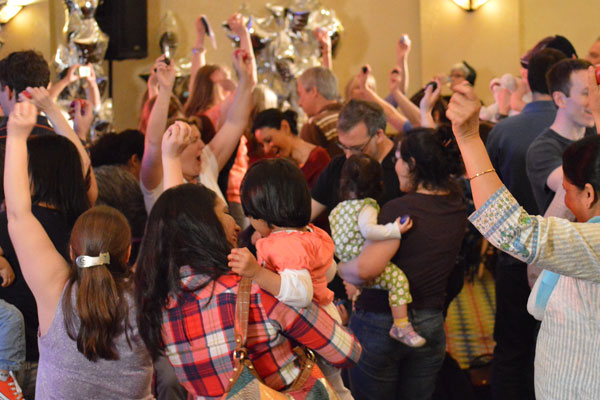Research Corner: The Science Behind Group Music-Making
Imperfect Harmony, the book reviewed this month by Music Together coauthor Dr. Lili M. Levinowitz, provides a fascinating and poignant glimpse into the impact of group music-making on an individual’s social and emotional well-being. You may wonder how singing in a group can have such an effect—after all, music isn’t a thing that nourishes us like food and it can’t physically give us a hug. Nevertheless, it has this power to comfort, to excite, to lift our spirits. The fields of science and psychology are helping us to better understand why engaging with music, particularly alongside others, is such a rewarding experience. As we are learning more and more, it’s a lot about the brain!

Research is revealing that the tangible feelings of reward and pleasure we experience during music activities may be related to the ways in which music physically impacts our brain. Music stimulates areas of the brain involved with motivation, reward, and emotion. Making or listening to music can result in increased levels of dopamine, a neurotransmitter that stimulates the brain’s reward system. (That’s what can lead to that “chill” we get when we hear or make great music.)
It has also been noted that the brains of different individuals react with similar patterns of brain activity when listening to the same music. Brain imaging machines that can scan and register brain activity (often called an fMRI) have recorded and “mapped” heightened activity in the same areas of people’s brains while they listen to the same music for the first time. Certain areas and connections “light up” in similar patterns in different individuals, indicating that their brains are reacting to the music in similar ways.

In a past newsletter, we shared with you some of the more recent research exploring how music-making as a shared experience can activate and synchronize similar neural connections in all those participating in the music. This synchronization can result in feelings of empathy and shared intention that can promote positive social interaction and bonding. Check it out if you’d like to learn more!
The science behind music’s effect on our brain can be complicated and confusing, but it’s also interesting. If you want to learn more about this topic and enjoyed Lili’s book review, check out this NPR Talk of the Nation podcast where Stacy Horn, the author of Imperfect Harmony, and Dr. Daniel Levitan (pre-eminent psychology professor, researcher, and author of This is Your Brain on Music) join in a discussion on the “science” of group singing.
If you have any questions about the studies cited above, please email news@musictogether.com.
References:
Hughes, Virginia. “Why Does Music Feel So Good?” April 11, 2013:
http://phenomena.nationalgeographic.com/2013/04/11/why-does-music-feel-so-good/.
“Imperfect Harmony: How Singing With Others Changes Your Life.” Narrated by Ari Shaprio. Talk of the Nation. NPR, June 03, 2013: http://www.npr.org/2013/06/03/188355968/imperfect-harmony-how-chorale-singing-changes-lives.
“New Study Shows Different Brains Have Similar Responses to Music.” April 10, 2013:
http://medicalxpress.com/news/2013-04-brains-similar-responses-music.html.



